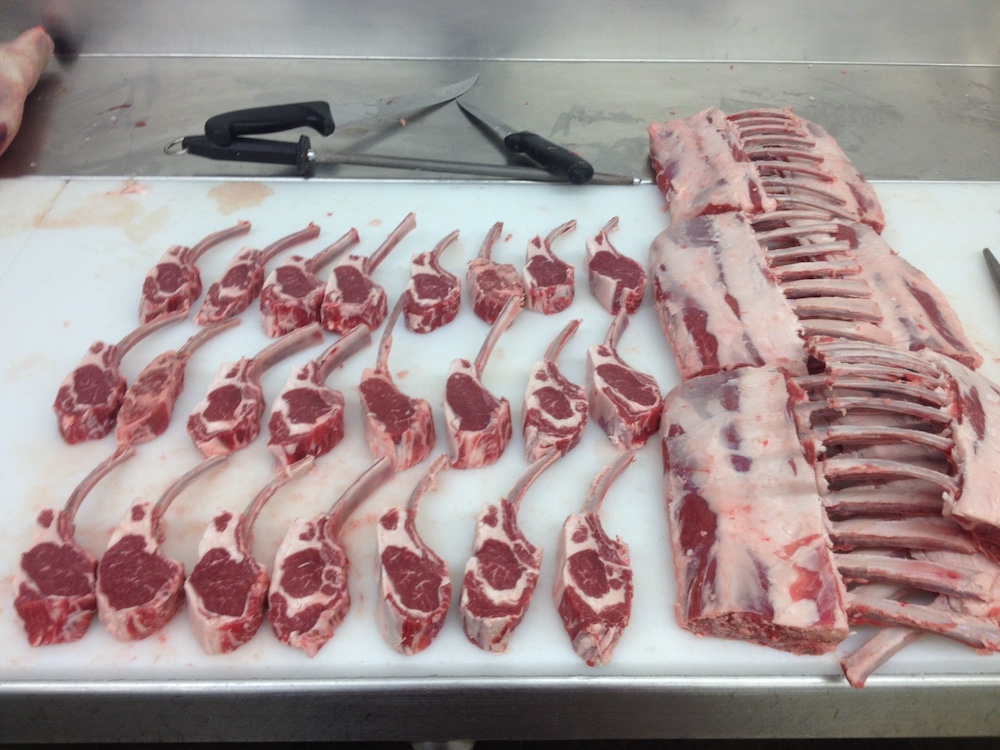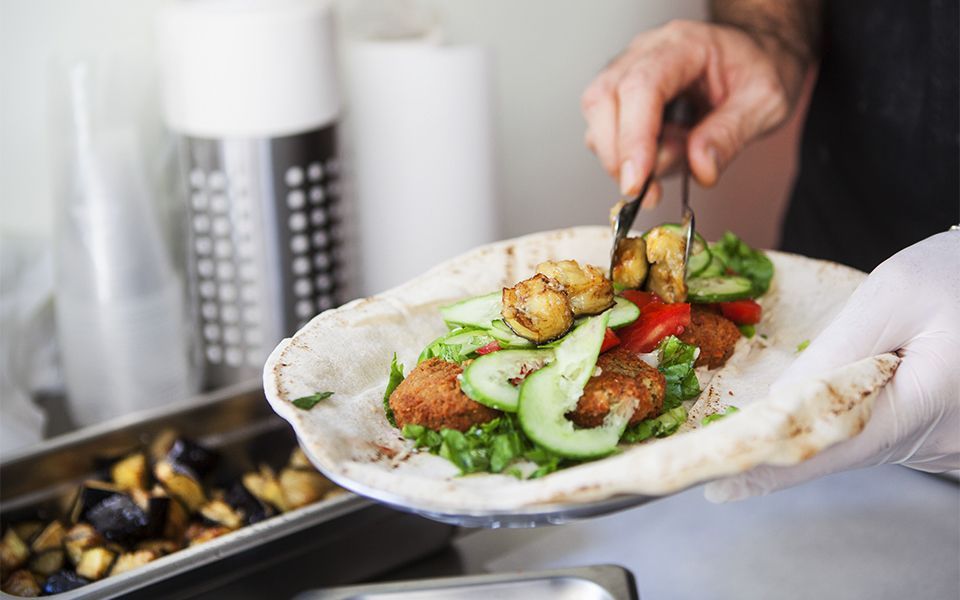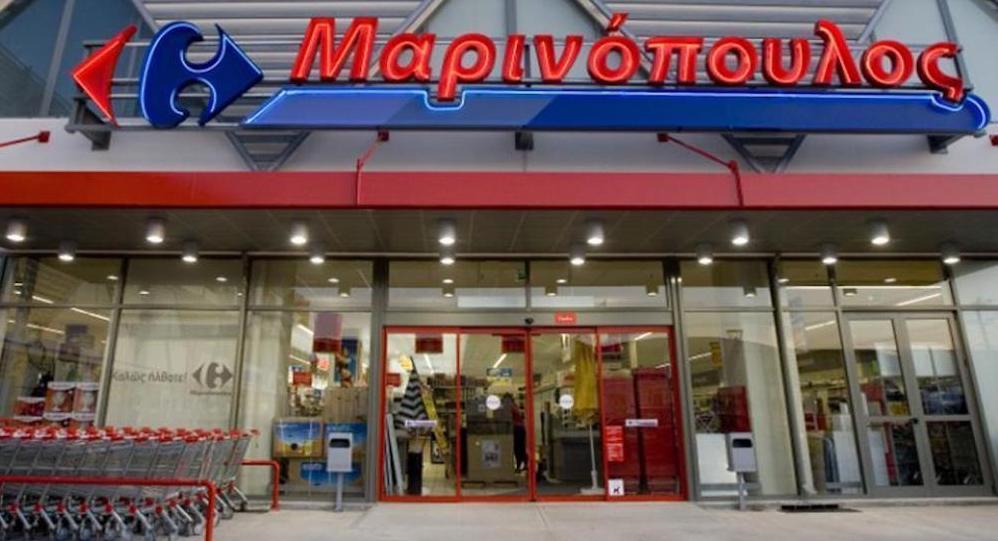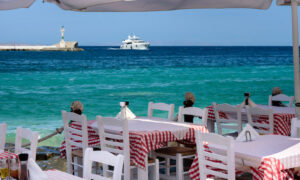You might think that food – shopping and eating out – in Greece is easy for new residents, but if you can’t read or speak Greek, there are unforeseen pitfalls in store at Greek markets. So here’s my guide to Greek food.
I had not realised this until recently when some friends from the United Kingdom came to stay with me. They offered to go shopping for me, so I made a list of the Greek food we needed, and off they went. I think that part of the expedition went well, but there were problems when they decided to buy things that were not on the list.
I had itemised things in English and Greek, but not brand names.
Problems with supermarkets

Butter is βούτυρο [voutiro] in Greek, for example, and as I knew my friends preferred it on their toast to a butter-like spread, it was on the list. I don’t think about it much now, as I buy an olive-based spread which is easier to find than butter. Because most butter is imported (you can find Lurpak in some supermarkets), it’s expensive, and I think the spread I use is healthier than butter.
My friends came back from their expedition minus butter and spread, or so I thought. However, I discovered that there was a glass jar lurking in the shopping bag, and it was apparently butter. The label clearly read βούτυρο … butter. We made toast and opened the jar. The smell was overwhelming. Decidedly not the butter we were used to. What a disappointment.
There was still a little spread left, so we had a meagre amount on the toast. A Greek friend called in later and I produced the jar. She became quite animated and said the stuff was wonderful and rare! It was certainly expensive, and its gooey consistency was quite unlike any butter I had previously encountered.
I gave it to my friend who clearly thought of it as a delicacy.
Had I written the brand name on the list, we would have had recognisable butter. Never mind, we learned a lesson: Don’t buy butter in jars.

At the butcher’s
After that, we all went to the local butcher’s and my friends were quite fascinated with the different cuts of meat. The lamb and pork chops were recognisable, but there were chicken “chop,” the Greek for lamb chops is αρνίσια-παϊδάκια while for pork chops it’s χοιρινή μπριζόλα (hirini brizola) with brizola being “chop” and hirini being “pork.”
Chicken chops, κοτόπουλο μπριζόλα, are chicken ribs with a little meat clinging to the bones – expensive for what they are. You pay for the dubious pleasure of holding them with your fingers and chomping at the meat.
I still have difficulty buying steak, as well as certain cuts of meat. I like liver, for example, but it can come with the surrounding offal. With all attached, it’s called skotaria, while only liver is sikoti. Some butchers like to foist you off with the whole thing and you have to refuse it.
Of course, you could buy the whole thing and cook it for animals. I’m told that you cut all the skotaria into small pieces, fry and then boil them and serve with lemon and oregano.
The best thing to do is to show the butcher a picture of the cut of meat you want. He will undoubtedly recognise it But bear in mind that fillet steak is expensive so there isn’t much call for it.
Alternatively the butcher might ask how you intend cooking the meat – grilled, casseroled and so on. He will then suggest a cut and show a piece of the meat to you so that you can decide whether you want it or not. Try and learn how in Greek to describe how you want to cook the meat and test your new vocabulary on the butcher.
For example, “roasted” is ψητο (psito) as in ψητο κοτοπουλο (psito kotopoulo, or roasted chicken).
A good butcher will be able to prepare a crown of lamb for you, but again … he’d (and they’re mostly “hes”) wonder how you intend cooking it.
Be prepared to offer an explanation in Greek.

Bacon is disappointing
One disappointing thing for me is not being able to buy back bacon, or other types. All there is here in supermarkets is see-through-thin slices of streaky bacon, sold in packages. No decent bacon sandwiches to be had here. I miss them.
Once, many years ago, a friend in the UK, asked what I’d like from Britain. Marmite and thick back bacon were top of my list. His mother wrapped the bacon in plastic and aluminum foil so that it would travel well. Unfortunately, when his suitcase was X-rayed before it was put in the plane’s hold, it appeared to the airport officials to be the plastic explosive. Semtex.
Luckily he explained what it was before the suitcase was blown up. I never asked anyone to bring me bacon again.
Street food

Toast in Greece isn’t just toasted bread. You can buy ‘tost’ in fast food outlets, but these ‘tosts’ are a type of pitta bread grilled lightly and filled with ham, cheese or whatever is to hand.
Then there’s the ubiquitous souvlaki or kalamaki. Souvlaki – usually pork grilled on a skewer – is what you have in restaurants. Kalamaki are small pieces of pork grilled on thin wooden sticks. This is what you get in fast food places or on the street. It might be called souvlaki, which causes some confusion when you are presented with a bill in a restaurant and it’s much more expensive than you expected.
Of course, this shouldn’t happen as clearly you get more in a taverna than you do on the street. The meat is better quality too.
In autumn and winter, you can sometimes buy roast chestnuts on the street, and there’s also salep. This savory drink warms you in winter, but in Greece, it’s sold on the street, though probably not made from the tubers of orchids, as it would once have been.
Sometimes you can find toasted nuts on the street too. It would be nice if you could find jacket potatoes with a selection of fillings to choose from on the streets, but I have yet to find any. Greeks like their potatoes peeled. They don’t really have the right variety of potatoes here, I suspect.
Be prepared to make mistakes
If you try to speak Greek when you are shopping, you will find that people respond well to your efforts. I once totally forgot the word for eggs – αύγα and proceeded to flap my arms and mime laying an egg. Everyone laughed and I was asked to do an encore.
I have never forgotten that word since.
Making mistakes is a good way to learn a language, and making people laugh breaks the ice.
Best of all, you end up making friends.

Here are more of Lynne’s posts about her adventures in Greece:
Lynne Evans: The unvarnished truth about living in Greece
Expat Essentials: Lynne Evans’s expat guide to moving to Athens
Lynne Evans in Athens: An expat’s misadventures in the Greek healthcare system
Lynne Evans on daily life in Athens, the newly crowned European Capital of Innovation
Lynne Evans on Greece wildfires: ‘We can’t keep destroying Athens’ environment’
Lynne Evans in Athens: More tips to navigating the expat life in Greece
Lynne Evans: The trials, tribulations and absolute pleasures of living in Greece














